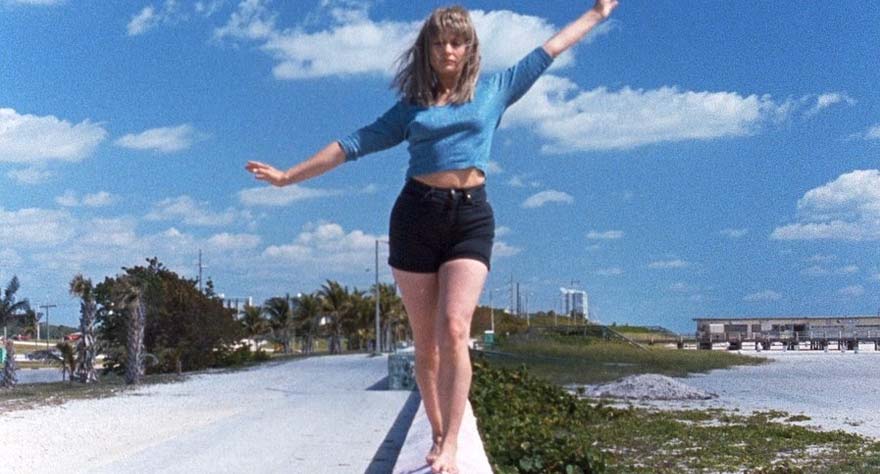
Kelly Reichardt's debut film is a definite building block for the auteur and an entertaining entry into '90s indie film.

Kelly Reichardt's debut film is a definite building block for the auteur and an entertaining entry into '90s indie film.
It always feels important to rediscover an established filmmaker’s earliest work. There’s a unique artistic pleasure in dissecting the roots, looking for the under-developed thematic, narrative or formalistic signs of eventual greatness—almost as if we are over-analyzing a childhood to reconcile why someone became a serial killer. With its re-release at the IFC Center in New York on Friday, March 11th, our eyes fix on Kelly Reichardt’s River of Grass. It’s difficult to find reviews of the film from its premiere at the 1994 Sundance Film Festival and its subsequent limited theatrical release, but by all accounts, it received solid buzz considering it was a debut film. River of Grass was nominated for the Grand Jury Prize at Sundance when the festival was at the height of its grassroots independent glory. Interestingly, Tom Noonan’s directorial debut What Happened Was (a film by a notable filmmaker that has been similarly forgotten) won the prize, which competed in a lineup that included Clerks, Spanking the Monkey and Hoop Dreams—three films that cemented the cultural importance of Sundance at the time. Twelve years after River of Grass, Reichardt made her breakout film Old Joy and has been on an indie cred tear ever since.
River of Grass stars Lisa Bowman as Cozy, a bored wife and mother, stuck in a boring life with a boring family in a boring community. Restless, she decides to hit the bar one night, abandoning her motherly responsibilities in the process. She meets Lee Ray (Larry Fessenden), a young slacker who has recently come into the possession of a gun. They connect, leave the bar together and eventually get into some trouble because of that loaded gun. Cozy and Lee Ray are now tied together by murder, a bond which Cozy notes is stronger than the bond of marriage. The two leads give very fine, understated performances, with Bowman particularly good in the weirder and quieter moments. Fessenden, in one of his earliest performance, brings energy to the film.
The film is very much in line with the 1990s Sundance indie from which it came. The offbeat characters, loose narrative, crime elements and hushed voice-over are all trademarks of its time, which gives the film a bit of a time capsule feeling. It also has an up-front comedic sense that we don’t associate with most of Reichardt’s films, but was definitely a part of indie cinema at the time. From a recurring joke with a profane punchline and weird character moments, the film is consistently funny. Sometimes it’s absurd too, like when Cozy and Lee Roy are on the lam only to be revealed they are in the same city as where they started. It’s the standard couple-on-the-run plot through the ’90s slacker sensibility. They see themselves as dangerous bandits but are ultimately too chickenshit to run through a toll stop. When they do eventually try to leave southern Florida, they fail in about the most pathetic way possible. Even Cozy’s monotone voice-over becomes humorous in its super serious pseudo-philosophy: Cozy’s realization of “If we weren’t killers, we weren’t anything,” for example.
For Reichardt, River of Grass is very much in line with her look at small communities. The film’s title comes from a Native nickname for the Everglades, the Florida swampland only miles outside of Miami with the complete opposite aesthetic. Instead of the bright fluorescent lights, beaches and nightclubs, the “River of Grass” is rural with miles of flat land dissected by lonely highways. The inhabitants are working-class and semi-transient, similar to their Northwest counterparts in Wendy and Lucy and Old Joy.
At less than 80 minutes, the film reveals itself as more of a slice-of-life than it seemed. This is perhaps what makes River of Grass most like its auteur’s work. All of Reichardt’s films, no matter how profound, emotionally or thematically rich, are very much a moment in their characters’ lives. Like Meek’s Cutoff, River of Grass ends with a particular sense of dread, but just open-ended enough not to pin down. Certainly, Reichardt could have expanded Cozy and Lee Ray’s life, added more debauchery or heightened the stakes of their criminal fall-out, but she chose to keep the narrative shaggy and simple—sure, the ultra-strapped indie budget probably had a practical effect on the film’s length, but there is the beginning of a narrative line here.
I don’t know why River of Grass didn’t immediately achieve a cult reception similar to Reservoir Dogs, True Romance, Clerks or other films similar in their time and space, but thankfully Kelly Reichardt persevered, allowing you to take a look back to over-analyze or simply discover the roots of one of today’s most important filmmakers. It shouldn’t be forgotten, however, that River of Grass is a very good debut in its own right. The film is often funny, often elusive, and very confident in its style and narrative presentation.